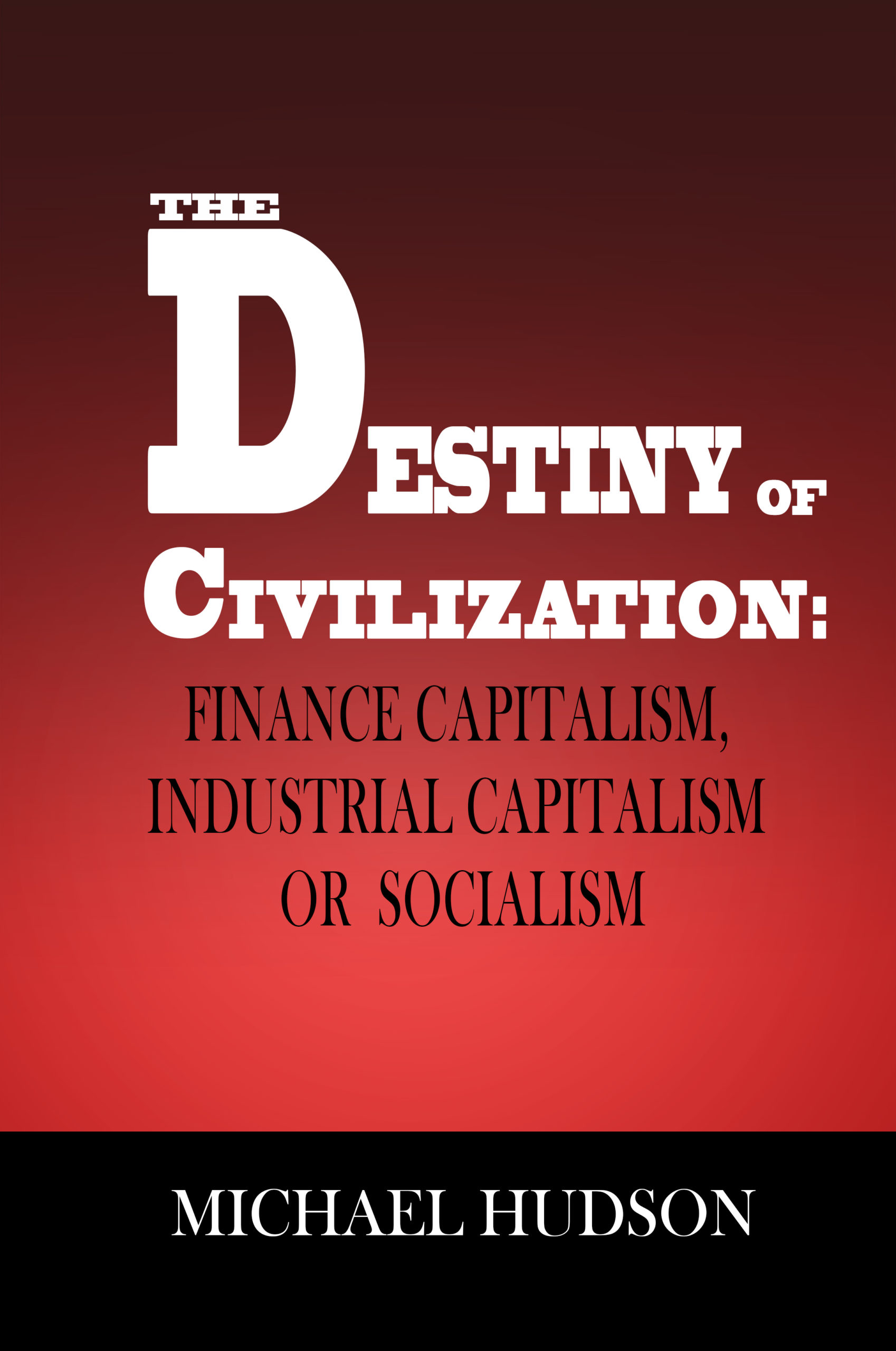“The decline of the West is not necessary or historically inevitable. It is the result of choosing policies dictated by its rentier interests. … The threat posed to society by rentier interests is the great challenge of every nation today: whether its government can restrict the dynamics of finance capitalism and prevent an oligarchy from dominating the state and enriching itself by imposing austerity on labor and industry. So far, the West has not risen to this challenge.” “There are essentially two types of society: mixed economies with public checks and balances, and oligarchies that dismantle and privatize the state, taking over its monetary and credit system, the land and basic infrastructure to enrich themselves but choking the economy, not helping it grow.”
Topics:
Michael Hudson considers the following as important: Books, The Destiny of Civilization
This could be interesting, too:
Robert Skidelsky writes A Tale of Frankenstein – Lecture at Bard College
Robert Skidelsky writes In Memory of David P. Calleo – Bologna Conference
Robert Skidelsky writes Keen On Podcast: Episode 2229: Robert Skidelsky worries about the Human Condition in the Age of Artificial Intelligence
Michael Hudson writes Temples of Enterprise

“The decline of the West is not necessary or historically inevitable. It is the result of choosing policies dictated by its rentier interests. … The threat posed to society by rentier interests is the great challenge of every nation today: whether its government can restrict the dynamics of finance capitalism and prevent an oligarchy from dominating the state and enriching itself by imposing austerity on labor and industry. So far, the West has not risen to this challenge.”
“There are essentially two types of society: mixed economies with public checks and balances, and oligarchies that dismantle and privatize the state, taking over its monetary and credit system, the land and basic infrastructure to enrich themselves but choking the economy, not helping it grow.”
………………………………………………………………………….
The Destiny of Civilization is based on a lecture series on finance capitalism and the New Cold War that Michael Hudson presented for the Global University for Sustainability. It presents an overview of Michael’s unique geo-political perspective: analysis which integrates economics, history, politics, archaeology and psychology.
Most importantly, Michael applies his macro analysis to explain how the world has arrived at this point of fracture, where a financialized and de-industrialized United States is facing off against the mixed-economies of China and Russia.
He emphasises that There Are Alternatives (TAA) to the neoliberal finance capitalism that prevails in the West, and that civilization is today at a fork in the road:
- one path leading to a neoliberal neo-feudalism dominated by a rentier oligarchy ruling over the indebted many.
- the alternative path is broadly mixed-economy industrial capitalism leading to socialism.
Hudson cuts to the big issues, conveying that ‘The role of government has been inverted away from one which was to protect society from the rentiers, but now sees rentiers protected and even encouraged by government’.
The book’s scope takes the reader inside the levers of power, spanning several thousand years:
- the origins of money and credit, debt cancellations, and land tenure in the first cities of Ancient Mesopotamia;
- from Classical Greece to Rome’s collapse into a Dark Age of feudalism, and the arresting parallels to today;
- the development arc of Britain and the United States as industrial powers, and why classical thinkers expected they would move towards socialism;
- America’s strategic use of financial and creditor power after WWI and again after WWII to structure the world economy in its own interests, orchestrating global economic dominance;
- the alternatives to neoliberal finance capitalism, and the policies needed to restrain this underlying rentier dynamic.
The Destiny of Civilization is a book of hope for humanity.
Reviews
“Michael Hudson’s book is innovative, inspiring, incisive and worthy of the widest possible dissemination and discussion … it is splendid to have this work out there.”
Prof. David Harvey, Distinguished Professor of Anthropology and Geography,
CUNY Graduate Center
“The book explains why the New Cold War’s U.S.-China conflict cannot simply be regarded as market competition between two industrial rivals. It is a broader conflict between different political economic systems – not only between capitalism and socialism as such, but between the logic of an industrial economy and that of a financialized rentier economy increasingly dependent on foreign subsidy and exploitation as its own domestic economy shrivels.
“Professor Hudson endeavors to revive classical political economy in order to reverse the neoclassical counter-revolution. … The book explains why the U.S. and other Western economies have lost their former momentum: A narrow rentier class has gained control and become the new central planner, using its power to drain income from increasingly indebted and high-cost labor and industry. The American disease of de-industrialization has resulted from the costs of industrial production being inflated by the economic rents extracted by this class under the system of financialized monopoly capitalism that now prevails throughout the West.”
Prof. Wen Tiejun, Executive Dean, Institute of Rural Reconstruction of China, Southwest University, China.
Buy your copy now, the must-have book summing up Michael’s key works.
